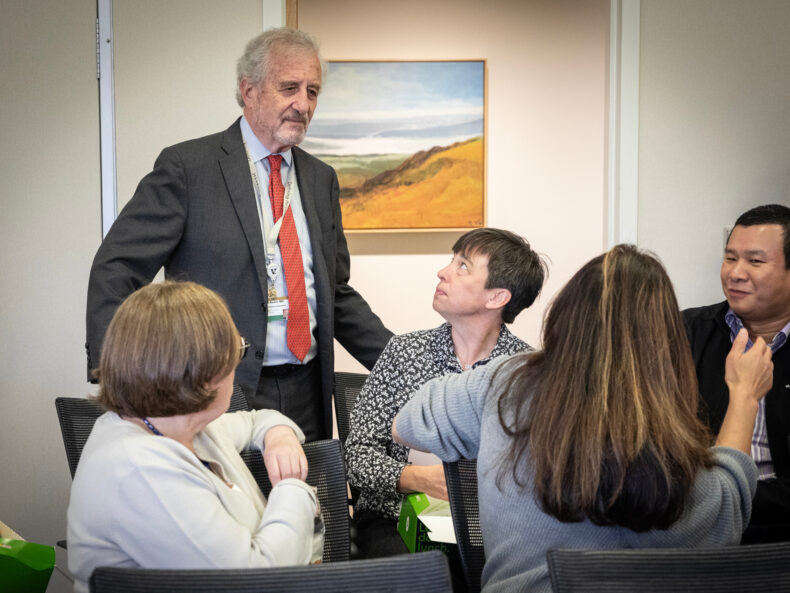Vanderbilt University researchers have received two major federal grants — totaling $7.6 million over four years — to support ground-breaking research aimed at making genetic information a routine part of patients’ electronic medical records.
This is a major component of “precision medicine.” The goal is to provide a laser-like focus to disease diagnosis and treatment so that patients can get the treatments most likely to work for them, and with the fewest side effects.
“This is an important step toward the routine use of genetic data in routine health care,” said Dan Roden, M.D., assistant vice chancellor for Personalized Medicine and William Stokes Professor of Experimental Therapeutics.
Roden and Josh Denny, M.D., M.S., associate professor of Biomedical Informatics and Medicine, are co-principal investigators of one of the grants, which will support the identification of rare genetic variations affecting the risk of common diseases like cancer and response to treatment.
Paul Harris, Ph.D., professor of Biomedical Informatics and Biomedical Engineering, is principal investigator of the second grant, which will expand the capacity of a Vanderbilt-based coordinating center to support research conducted through the Electronic Medical Records and Genomics (eMERGE) program.
Overall, 12 grants were awarded last week by the National Institutes of Health (NIH) to launch the third phase of the eMERGE program, which is administered by the National Human Genome Research Institute.
Vanderbilt is one of 10 institutions participating in the program through the eMERGE network and has served as the network’s coordinating center since its inception in 2007.
“In previous cycles we focused on common genetic variants and on pharmacogenetic variants,” which affect drug response, Roden said. “In the current cycle, we will be using (DNA) sequence data to identify rare variants that might confer unusually large risk for common diseases like cancer, arrhythmias or heart failure.
“We will then be asking which of those variants actually confer risk, and how participating patients and their doctors react to learning about these variants,” he said.
Harris, director of the Office of Research Informatics, said the coordinating center grant will expand its capability to provide expertise in information management, privacy research, network operations, implementation science, informatics platforms and overall coordination of the eMERGE network.
Vanderbilt is a national leader in the fields of pharmacogenomics, how variations in the genetic code can affect response to drug treatment, and biomedical informatics, the use of biomedical data and knowledge in research and clinical settings to improve human health.
Roden, Denny and Harris have played key roles in the development of research tools and projects at Vanderbilt that are at the cutting edge of these fields. They include:
• PREDICT (Pharmacogenomic Resource for Enhanced Decisions in Care & Treatment), a project spearheaded by Roden that genotypes the DNA of Vanderbilt patients for genetic variations that may affect their response to certain drugs;
• BioVU, which, with more than 200,000 DNA samples, is one of the world’s leading bio-banks;
• The Synthetic Derivative, clinical information derived from electronic medical records that has been stripped of personal identifiers; and
• REDCap, a data management platform developed by Harris that is used by biomedical researchers across the world.
Denny is principal investigator of the Synthetic Derivative, and Roden is principal investigator of BioVU. The combination enables researchers to hone in on genes that are linked to specific health conditions.
Last year Roden, who also is professor of Medicine and Pharmacology and director of the Oates Institute of Experimental Therapeutics, was appointed to the National Advisory Council for Human Genome Research of the NIH.
He and Denny are co-principal investigators with Elizabeth Phillips, M.D., of five-year, $12.8-million grant awarded earlier this summer by the NIH to establish a specialized research center for pharmacogenomics in precision medicine.
Denny is senior advisor to the NIH Office of the Director, and a member of the Precision Medicine Initiative Working Group of the Advisory Committee to the NIH Director.
The working group, which held a public workshop at Vanderbilt in May, will deliver recommendations for building a national cohort of 1 million or more research participants later this month, he said.











